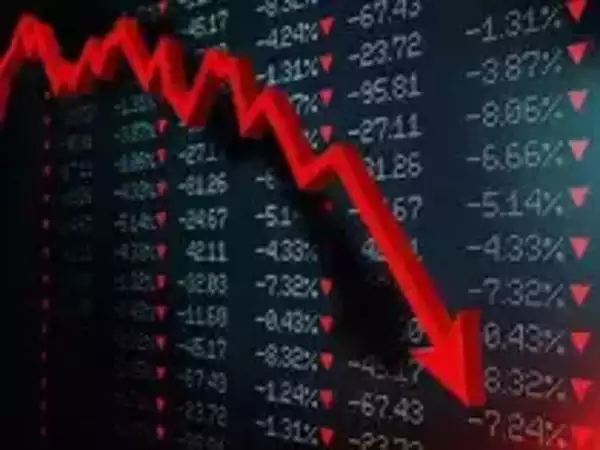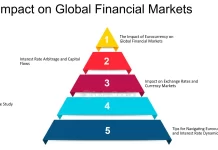Markets plummet more than 2.5 percent as a result of a worldwide sell-off, rattled by the United States and Japan
The entire value of all listed shares, or market capitalization, of the BSE-listed companies fell by Rs 15 lakh crore on Monday to Rs 441.84 lakh crore, from Rs 457.16 lakh crore on August 2.
The domestic stock market indices, Sensex and Nifty, experienced a significant decline of over 2.5 percent, marking the largest drop in two months. The reasons behind the decline were investors’ selling of riskier assets due to concerns about a US recession, the unwinding of Yen carry trades following the Bank of Japan’s interest rate hike, and geopolitical tensions in the Middle East.
The Nifty 50 plummeted 2.68 percent, or 662.1 points, to settle at 24,055.6, while the 30-share Sensex on the BSE fell 2,222.55 points, or 2.74 percent, to conclude at 78,759.40. Both indices had declines of more than 3% during intraday trading. This is the biggest one-day decline since June 4, the day the results of the Lok Sabha election were released, causing Sensex and Nifty to plummet 6%.
The entire value of all listed shares, or market capitalization, of the BSE-listed companies fell by Rs 15 lakh crore on Monday to Rs 441.84 lakh crore, from Rs 457.16 lakh crore on August 2.
According to exchange statistics, domestic institutional investors (DIIs) purchased Rs 9,155.55 crore of Indian equities while foreign institutional investors (FIIs) offloaded shares worth Rs 10,073.75 crore.
Additionally, as a result of a sell-off in international markets, the rupee fell 37 paise to settle at an all-time low of 84.09 against the US dollar on Monday.
Following bad economic data last week, investors’ risk appetite shrank, contributing to Wall Street’s key indexes’ Monday decline. This was due to fears of a US recession. As the day went on, investors’ concerns subsided and market losses were limited after statistics revealed that US services sector activity in July increased from a four-year low due to an increase in orders and employment, according to Reuters.
Business must relieve government of capital expenditure heavy lifting: RBI article
“Asian markets plunged on Monday with Nikkei falling more than 12 percent due to a disappointing job scenario in the US coupled with the fear of a reverse Yen carry trade, following an interest rate hike in Japan,” stated Deepak Jasani, Head of Retail Research at HDFC Securities.
According to exchange statistics, domestic institutional investors (DIIs) purchased Rs 9,155.55 crore of Indian equities while foreign institutional investors (FIIs) offloaded shares worth Rs 10,073.75 crore.
Additionally, as a result of a sell-off in international markets, the rupee fell 37 paise to settle at an all-time low of 84.09 against the US dollar on Monday.
Following bad economic data last week, investors’ risk appetite shrank, contributing to Wall Street’s key indexes’ Monday decline. This was due to fears of a US recession. As the day went on, investors’ concerns subsided and market losses were limited after statistics revealed that US services sector activity in July increased from a four-year low due to an increase in orders and employment, according to Reuters.
“Asian markets plunged on Monday with Nikkei falling more than 12 percent due to a disappointing job scenario in the US coupled with the fear of a reverse Yen carry trade, following an interest rate hike in Japan,” stated Deepak Jasani, Head of Retail Research at HDFC Securities.
The US unemployment rate increased to 4.3% in July, and nonfarm payroll employment increased by 114,000, adding to the growing concern about a collapsing labor market and potential economic downturn.
In addition to the unemployment rate and job growth that made headlines, the household survey also showed an increase in job losses, which is usually an indication of an impending recession. Nomura stated in a research that “there is a chance that the increase in job losses is merely a one-time event rather than the beginning of a worsening trend, given the unusual rise in temporary layoffs and evidence of a negative weather effect.”
The US Federal Reserve signaled a rate reduction in September while maintaining interest rates at 5.25–5.5 percent last week.
According to Jasani, experts and investors disagree on whether the Federal Reserve should quicken its policy easing in order to boost GDP.
In an effort to stem the decline of the Yen relative to the US dollar, the Bank of Japan increased its benchmark interest rate from 0.1% to 0.25 percent recently.
“Financial markets are falling as a result of the unwinding of the great Japanese Yen carry trade,” stated Apurva Sheth, Head of Market Perspectives and Research at SAMCO Securities. Using the carry trade method, investors fund a transaction using a low-yielding currency by using a high-yielding one.
The market’s decline on Monday was also influenced by the geopolitical unrest in the Middle East.
Market analysts claim that while the Indian economy is still strong, the market’s decline was mostly caused by external causes. Retail investors shouldn’t freak out or worry about their investments, they advised.
Despite some recent foreign events and growing geopolitical dangers, India’s economy and equity markets are still growing because to solid corporate fundamentals. Such global uncertainty shouldn’t, in my opinion, discourage long-term investors. According to A Balasubramanian, MD & CEO of Aditya Birla Sun Life AMC Ltd., “the focus should remain on the broader investment horizon of 10-15 years, leveraging the solid fundamentals of the Indian economy and its companies.”
The market saw a widespread sell-off, with all of the main indices finishing the day in the red. The Nifty Midcap 100 fell 3.55%, while the Nifty Smallcap 100 fell 4.57%. The sectoral indices Nifty Auto and Nifty Bank experienced declines of 3.92% and 2.45%, respectively.
Tata Motors (7.4%), ONGC (6.39%), Adani Ports and Special Economic Zone (5.92%), Tata Steel (5.61%), and Hindalco Industries (5.25%) were the NSE businesses that suffered the worst losses.





























